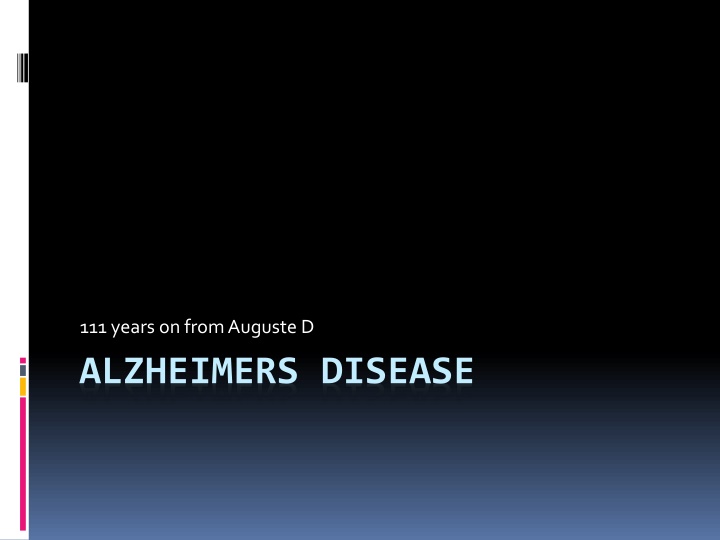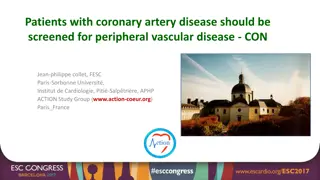
Alzheimer's Disease and Dementia Progression
Explore the historical context, early diagnosis, medication issues, and future advancements related to Alzheimer's disease and dementia progression. Learn about key figures like Auguste Deter and Dr. Alzheimer, as well as the evolution of Mild Cognitive Impairment and its role as a prodrome of Alzheimer's Disease. Discover the importance of biomarkers in identifying neurodegeneration and increased beta-amyloid burden. Stay informed about the transition from healthy aging to clinical dementia and the critical need for early recognition.
Download Presentation

Please find below an Image/Link to download the presentation.
The content on the website is provided AS IS for your information and personal use only. It may not be sold, licensed, or shared on other websites without obtaining consent from the author. If you encounter any issues during the download, it is possible that the publisher has removed the file from their server.
You are allowed to download the files provided on this website for personal or commercial use, subject to the condition that they are used lawfully. All files are the property of their respective owners.
The content on the website is provided AS IS for your information and personal use only. It may not be sold, licensed, or shared on other websites without obtaining consent from the author.
E N D
Presentation Transcript
111 years on from Auguste D ALZHEIMERS DISEASE
Dementia update Historical context Early diagnosis MCI Medication issues, current and future Driving Any questions?
AugusteD 1901 Paper 1907 Alzheimers disease Kraplein 1910 (rare preseniledementia) Alzheimers Disease 1977, amyloid plaques NFT 1984 1993 Choline esterase inhibitors 2000 memantine
MCI Transition healthy ageing to clinical dementia Driven by need for early recognition Broadening of initial construct away from prodromal AD
Mild Cognitive Impairment Concept developed in late 1980s 2003 symposium DSM V
MCI criteria Subjective concerns from patient, informant or clinician Evidence of impairment in one or more domains Preservation of function
MCI sub types aMCI (single) aMCI (multiple) naMCI (single) naMCI (multiple)
MCI as a prodrome of AD Uncertain: clinical MCI, no biomarkers Intermediate: MCI plus evidence of increased amyloid or neurodegeneration High Probability: MCI plus amyloid plus neurodegeneration
Biomarkers (Increased Beta- amyloid burden) PET studies (Pittsburgh compound) CSF AB42 levels
Biomarkers (neurodegeneration) CSF Tau Hippocampal/ medial temporal lobe volume MRI FDG-PET (hypoperfusion) SPECT perfusion
Clinically useful? Prevalence rates ( >65) ~ 20% Conversion to clinical dementia ~ 10% (20% in Memory Clinic) per year No evidence of benefit from treatment with Cognitive Enhancers, no alteration of conversion rate
Identification of presymptomatic AD Not possible currently Peripheral biomarkers Pathology developing for 10 20 yrsbefore symptoms
So MCI useful in identifying those at higher risk of subsequently developing AD Use of biomarkers limited to research Important group to monitor
Screening tools Over estimation of value Must always be seen in context of underlying prevalence
medication Choline esterase Inhibitors Memantine Anti depressants Mood stabilisers Anti psychotics benzodiazepines
Choline Esterase Inhibitors Donepezil, Galantamine, Rivastigmine No difference in efficacy Donepezil easy to use, cheap Transdermal Rivastigmine, PD dementia
Choline Esterase Inhibitors Mild moderate AD Modest effect on cognition, care giver burden, delay need for institutional care Can be helpful in non cognitive symptoms, particularly agitation and psychosis
Memantine Mod- severe AD Intolerant of AchEI s Modest effect on cognitive symptoms/function Helpful with non cognitive symptoms, particularly those with a significant affective component
Memantine & AchEIs in combination Complimentary actions Good evidence base SABP reviewing guidance Cognitive & non cognitive symptoms
Anti depressants Generally safe Conflicting evidence from studies Useful in affective lability, irritability, emotional incontinence Best evidence for Sertraline & citalopram, increasing for Mirtazepine
Anti psychotics Have been over used Not the work of Satan But increase all cause mortality, increase incidence of cerebrovascular events, impair cognition Helpful in florid psychotic symptoms, aggression & agitation Best evidence for risperidone, then Olanzapine
Mood stabilisers Carbemazepine & gabapentin can be helpful in challenging behaviours Poorly tolerated Significant side effects Valproate not helpful
The future No drugs since memantine From 2002 to 2014: 244 compounds 413 clinical trials 99.6% failure rate
bapineuzumab Amyloid antibody Pfizer, J&J, Elan +ve mouse studies Reduces amyloid burden on PET Doesn t work X2 phase 3 trials Hundreds of Millions of dollars
2017 - SABP CREAD crenezumab, amyloid AB, phase 3 SYMBAD, BPSD, mirtazepine& carbemazepine Masitinib tyrosine kinase inhibitor, phase 3 , AD and ALS ELAN liraglutide, long acting glucagon like agonist, phase 3
Driving Individuals must inform DVLA Decision made on individual basis May issue driving licence for 12 months DVLA approved assessment centres
driving X 3 8 risk of RTA Risk linked to duration of symptoms and disease severity 3 years symptoms = 16 24 yrold male
Driving - factors to consider Subj reports unhelpful Poor correlation between informant & risk MMSE Tests of visuospatial function +/-executive function better predictive value
driving Moderate severe : stop Mild: consider referral to driving centre if any concerns






















